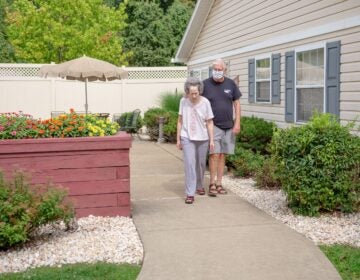Patients without family or health care proxies face overtreatment or limbo in hospitals
A program matches unrepresented patients with volunteers who can make care decisions for them during health care crises.
Listen 7:16
An elderly patient lying on hospital bed. (Bigstock/Rido81)
This story is from The Pulse, a weekly health and science podcast.
Find it on Apple Podcasts, Spotify, or wherever you get your podcasts.
Imagine this scenario. A man, 87, is taken to the emergency room from a nursing home. He has a very serious respiratory infection and dementia. Doctors are trying to decide next steps for this patient and how invasive the treatment should be. Usually, they would call somebody to help guide the process, a family member, or somebody who’s named in a medical directive.
But this patient doesn’t seem to have anyone the doctors could call.
Intensive care physician David Oxman has encountered this scenario several times.
“These people don’t have anyone to speak for them when they become incapacitated. And this creates not only big problems for the patient, but also for the hospital,” he said.
Oxman says unrepresented patients are a small, but growing group. Some have outlived their family members, or are estranged from them. Maybe they’ve moved a lot, sometimes substance use or homelessness plays a role. The situation is especially complicated with patients who have dementia, or who can’t communicate their wishes for other reasons.
Oxman, Associate Professor of Medicine, Sidney Kimmel Medical College at Thomas Jefferson University, is also a medical ethicist. He says unrepresented patients are at risk for not getting a treatment they need, because if it’s not an emergency situation, doctors can’t offer treatments they don’t have consent for. But, there is also a big issue with overtreatment, especially with patients at the end of life.
“There’s no one there to tell doctors not to do something. And for many reasons, because of the system we live in, doctors feel compelled to offer maximal treatment unless someone tells them to stop,” Oxman said.
Most states have provisions where medical guardians and medical decision makers can be appointed by a court, but that takes a long time. In the meantime, a search for relatives begins.
“The hospital spends a lot of time trying to identify somebody,” said Oxman. “Oftentimes, we get police engaged to try to find some long-lost relative. Sometimes we approach friends or people who may not traditionally be looked at to act as a health care agent, but who know the patient in some way, know their values, and may be able to help us make a decision.”
Sometimes, Oxman gets on the phone himself to find family members, even distant ones and if he does, he has to jump right into uncomfortable conversations with them.
“‘Your great uncle is critically ill, but he has advanced cancer. And perhaps advanced dementia,’” he said, giving a hypothetical example. “‘I don’t suspect him to survive this illness. I recommend that we don’t pursue putting him on a ventilator and going through intensive critical care. Do you agree with that? Would you help us make that decision?’” He says it’s another question if that person is really in a good position to make any decisions for the patient, but they’re trying to find somebody who has some standing.
Subscribe to The Pulse
In many cases, these distant relatives are overwhelmed, and tell Oxman that they don’t feel like they know the patient well enough to make such important decisions.
The situation has a big ripple effect. For patients, but also for hospitals. They create an enormous financial burden.
“Patients are often in the hospital much longer than they would be because of delays,” said Oxman. “ICU care and end-of-life care is prolonged. And then when a patient does survive, they can’t get placed in a facility without having someone just basically sign them in.” Instead, patients often end up in limbo in the hospital, with nowhere to go.
People are working on solutions for this difficult scenario. David Sontag, director of ethics for Beth Israel Lahey Health in Massachusetts, says this issue is important to a lot of people working in medicine.
“Hospital staff will experience significant distress when individuals, the patients they’re caring for, are not able to get the best available care,” he said.
Sontag came up with a way for health care providers to get involved. He created a matching program where health care professionals volunteer to represent patients, not within their own hospital systems because that could cross ethical boundaries, but at other hospitals.
“This is an opportunity for us to help some of the most vulnerable members of our communities, those who have nobody to speak for them when they can no longer speak for themselves. And that allows us to respect their autonomy throughout their lives,” he said.
All of the volunteers work in health care, but they get training on how to ask people what kind of care they want to receive — or not receive — in serious situations.
It’s key for the matching program to identify potentially unrepresented patients early on, before crisis situations arise. During routine visits or appointments, health care providers will often ask if patients have a health directive. If it turns out during that conversation that a patient doesn’t have anybody listed as their proxy in a worst-case scenario, they’re asked if they want to enroll in this program. If they do, they’re matched with a volunteer within a day or two.
“We connect the volunteer to that person, that participant, so that they can have a conversation and introduce themselves to each other,” said Sontag. “And at that point usually the participant will complete a health care proxy form, name the volunteer as their health care agent, and then have a conversation about the participant’s values, goals, and preferences so that the volunteer knows how to make decisions on their behalf if that time ever comes.”
This program has been running for over two years now, and Sontag says writing about it and talking about it at conferences has had a positive ripple effect in other health care institutions. “We have more people who are reaching out when they’ve heard about it to see how they might be able to start their own program.”
WHYY is your source for fact-based, in-depth journalism and information. As a nonprofit organization, we rely on financial support from readers like you. Please give today.







